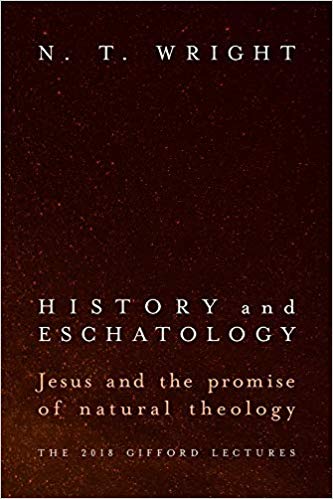(Available on Amazon for $31).
There are many good Tom Wright books, and amongst them there are a few great ones, even landmark studies. History and Eschatology. Jesus and the promise of natural theology falls into the latter category. It is 365 pages of sustained argument, carefully footnoted at length making Tom’s case to broaden the category of natural theology to include human history, and in particular Jesus and perhaps especially his death. The book is readily available now on Amazon, and is a must read for anyone who really cares to understand not merely natural theology, but the whole intellectual history from Epicureanism to the present that led us to our current dualistic worldview pitting the natural over against the supernatural, or the heavenly over against the earthly, or the bodily over against ‘the spiritual’ and so on. This review is going to take a number of blog posts, and at the end, as a bonus there will something else to be thankful for at Thanksgiving, namely a good dialogue with the author of the book himself about the case he is making in History and Eschatology.
This book, according to Tom took four years to write, and is in response to the request that he give the Gifford lectures, a lectureship that Rudolph Bultmann was the last NT scholar who was invited to do. Now there’s a contrast, to say the least. In his Preface Tom explains that the book is put together like a symphony, with four movements of two parts each. Tom describes the trajectory of the book as follows (pp. xiv-xvii): “I shall begin by putting the earlier quest for natural theology…into its determinative 18th and 19th century cultural context. There, following in particular the blow dealt to older possibilities by the Lisbon Earthquake of 1755, the philosophies of the Enlightenment were quick to reshape the discourse around new forms of Epicureanism…. In the second lecture I will show how the same distorted perspectives have worked their way through modern biblical studies. This includes Bultmann’s interpretation in his 1955 Giffords, of ‘history and eschatology’ to which my own title alludes. [N.B. there will be a heavy dose of critique of Bultmann’s existentialism and demythologizing agenda later in the book]. The historical study of the Bible…has been radically shaped by the variegated revivals of Epicureanism, which encouraged people to study the world without reference to God, and to study God without reference to the world— in particular to study theology without reference to history. What is sometimes called methodological naturalism exemplifies the first (the world without God) and the god of perfect being theology the second….This however raises the question of what history really is, and what it can and should achieve. [Then] we will have to turn our attention to eschatology and apocalyptic whose slippery meanings have frequently made historical work on Jesus difficult…the main positive proposals of the book, which begin in chapter 5 with the first century Jewish world and its symbols. The Temple spoke of the overlap of heaven and earth… The sabbath spoke of the age to come being truly anticipated within the present time. [T]he argument of chapter 6 [is] that with Jesus’ resurrection a new ontology and appropriate epistemology are unveiled…the epistemology of love. [The following chapter deals with ‘broken signposts’] the highest and best aspects of the human vocation, from ‘justice to love’…The argument of chapter 7 is precisely at this moment…the story of the cross…comes into play. [Chapter 8 discusses the missio dei, namely to anticipate and foreshadow the day when God will be all in all].
It was Sir Francis Bacon who rightly said—““Some books are to be tasted, others to be swallowed, and some few to be chewed and digested; that is, some books are to be read only in parts; others to be read, but not curiously; and some few are to be read wholly, and with diligence and attention.” This new book by Tom is decidedly the last kind of book.













